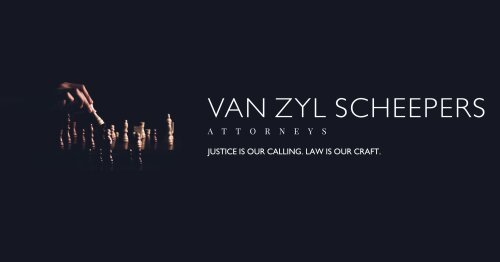Best Marriage Lawyers in Stellenbosch
Share your needs with us, get contacted by law firms.
Free. Takes 2 min.
Free Guide to Hiring a Family Lawyer
List of the best lawyers in Stellenbosch, South Africa
About Marriage Law in Stellenbosch, South Africa
Marriage in Stellenbosch, as part of South Africa, is governed by a variety of legal frameworks designed to accommodate the diverse cultures, religions, and personal preferences of its citizens. In South Africa, marriages can be governed by the Marriage Act, the Civil Union Act, or customary laws. Each provides specific processes and legal recognitions, catering to different needs and types of relationships. Civil marriages and civil unions are recognized nationally, providing spouses with legal rights and responsibilities. Understanding these frameworks is essential for anyone navigating marriage in Stellenbosch.
Why You May Need a Lawyer
Legal advice can be essential when dealing with marriage for several reasons. Common scenarios include prenuptial agreements, where couples wish to establish terms for asset division in case of divorce. Understanding legal implications in civil, customary, or religious marriages may require expert guidance. Additionally, instances of marital disputes, domestic violence, or the need to address immigration issues due to marriage citizenship requirements often necessitate legal counsel. Lawyers are instrumental in helping navigate these complex legal terrains while ensuring compliance with South African law.
Local Laws Overview
In Stellenbosch, and more broadly in South Africa, marriage is influenced by several key laws. The Marriage Act 25 of 1961 governs civil marriages, specifying requirements like legal age, consent, and necessary documentation. The Recognition of Customary Marriages Act 120 of 1998 acknowledges marriages according to African customary law, provided they're registered per the Act's stipulations. Civil unions, covered under the Civil Union Act 17 of 2006, offer similar legal recognitions and rights as civil marriage while accommodating same-sex couples. Furthermore, the Matrimonial Property Act regulates property regimes, offering options such as in community of property, out of community of property, and with or without accrual, which dictate financial arrangements between spouses.
Frequently Asked Questions
What is the legal age to get married in South Africa?
The legal age for marriage in South Africa is 18. However, individuals between 16 and 18 can marry with parental consent. Under customary law, boys must be at least 18 and girls at least 16 to marry.
Can foreigners get married in Stellenbosch?
Yes, foreigners can marry in Stellenbosch. They must provide valid passports, visas, and a letter of non-impediment from their home country indicating their eligibility to marry.
Is a prenuptial agreement recognized in South Africa?
Yes, prenuptial agreements, known as antenuptial contracts, are legally recognized in South Africa. These agreements must be signed before the marriage and govern property distribution in case of divorce or death.
What is a customary marriage?
A customary marriage is one conducted in accordance with indigenous African customary law. These marriages require no formal ceremony but must be registered with the Department of Home Affairs to have legal recognition.
Can we change our matrimonial property regime after marriage?
Changing the matrimonial property regime after marriage is possible but involves a legal process with court approval. Both spouses must consent and provide a valid reason for the change.
How are civil unions different from civil marriages?
Civil unions offer the same legal rights as civil marriages in South Africa but can cater to same-sex couples. Both civil marriages and civil unions entail similar legal and financial obligations.
What are the rights of spouses in a civil marriage?
In a civil marriage, spouses are entitled to property and spousal support rights, each having an equal share in the marriage's property unless otherwise stated by an antenuptial contract.
Is marriage counseling legally required before divorce?
No, marriage counseling is not legally required before divorce in South Africa. However, it is often recommended to help couples resolve conflicts that could lead to marriage dissolution.
How is divorce handled in South Africa?
Divorce in South Africa can be processed through the court based on irretrievable breakdown of the marriage or prolonged separation. South African law covers matters like child custody, maintenance, and asset distribution during divorce proceedings.
Is polygamy recognized in South Africa?
Yes, polygamy is recognized under the Recognition of Customary Marriages Act, which allows a man to have multiple wives if conducted according to customary law, while requiring each marriage to be registered.
Additional Resources
Several organizations and governmental bodies offer resources related to marriage in Stellenbosch. The South African Department of Home Affairs handles marriage registrations and related documentation. Legal Aid South Africa provides legal support and advice to those in need. Furthermore, the South African Law Society can help individuals find registered lawyers specializing in marriage law. Community organizations often provide counseling and mediation services for couples.
Next Steps
If legal assistance is required for marriage-related matters in Stellenbosch, the first step is to consult a legal professional specializing in family or marriage law. It's advisable to gather all necessary documentation and clearly outline any issues or questions. To find a lawyer, consider contacting the South African Law Society or asking for referrals from trusted sources. Assess different legal service providers based on expertise, fees, and client reviews to make an informed decision.
Lawzana helps you find the best lawyers and law firms in Stellenbosch through a curated and pre-screened list of qualified legal professionals. Our platform offers rankings and detailed profiles of attorneys and law firms, allowing you to compare based on practice areas, including Marriage, experience, and client feedback.
Each profile includes a description of the firm's areas of practice, client reviews, team members and partners, year of establishment, spoken languages, office locations, contact information, social media presence, and any published articles or resources. Most firms on our platform speak English and are experienced in both local and international legal matters.
Get a quote from top-rated law firms in Stellenbosch, South Africa — quickly, securely, and without unnecessary hassle.
Disclaimer:
The information provided on this page is for general informational purposes only and does not constitute legal advice. While we strive to ensure the accuracy and relevance of the content, legal information may change over time, and interpretations of the law can vary. You should always consult with a qualified legal professional for advice specific to your situation.
We disclaim all liability for actions taken or not taken based on the content of this page. If you believe any information is incorrect or outdated, please contact us, and we will review and update it where appropriate.











